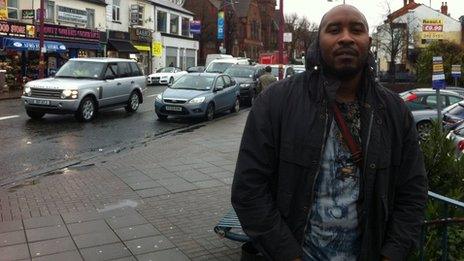Birmingham street gang eradication in 2013 'unrealistic'
- Published

In March 2011, Sharif Cousins set up the New Day Foundation, which aims to persuade young people in Handsworth not to become involved in gangs
It was a bold pledge by a senior police officer that within three years, street gangs in the West Midlands would be eradicated.
But, as the deadline set by former Ch Supt Tom Coughlan passed, it was clear the problem had not been achieved.
Figures just released by West Midlands Police however, show violent crime has been reduced in the last 10 years, even though officers accept eliminating gangs will not happen quickly, if at all.
Sgt Mark Bellingham, of the force's gang task force, said the statement made by former Ch Supt Coughlan to the BBC in 2009, external, was too optimistic.
Driven 'by greed'
"There's certainly less gang activity and there are still gangs that exist but there are fewer serious incidents compared with 10 years ago," he said.
"To say we'll eradicate them is going to take a very long time indeed, greed is part of our make up and while there is still money to be made those who see an opportunity will act."
Figures from the force show the number of incidents involving knives have almost halved since 2001-2, dropping to 2,237 in 2011-12.
Gun incidents were down to 622 from 1,285 in the same time frame.
Mr Bellingham, who has worked in the area for a number of years, said it felt like improvements had been made since the murders of Charlene Ellis and Letisha Shakespeare, external in Aston in January 2003, because "a lot of the ringleaders" from that time were sent to prison.
He said the progress was also down to better relationships with partner agencies, such as social services and youth offender organisations, in identifying people who need help.
Mr Bellingham added reducing gang crime meant "getting a generation ahead" and targeting youngsters aged 12 to 20.
Former gang member Sharif Cousins, 36 and from Handsworth, said not enough is done to tackle the issue.
He used to be part of the Burger Bar Boys, one of two rival gangs in Birmingham, and has spent nearly 14 years in prison.
'Proper nuisance'
It was while he was serving an eight-year term for firearms offences and intent to endanger life, he decided he "didn't want to be part of the problem any more".
"It gave me a chance to reflect on what I'd inflicted on the community, I used to make a proper nuisance of myself and realised the way I was living was not the way to be," he said.
"It would have been easier to go back to gang life but I want to make a difference to the place where I live."

Sgt Mark Bellingham said gang crime in the area seemed "less organised"
Mr Cousins believes the problem could only be properly tackled by ex-gang members and has set up the New Day Foundation, external to help persuade young people aged 13 to 30-years-old "not to get sucked in" to gang culture.
He said: "The young teenagers are the most vulnerable but it's hard for them as their options are limited and they've got nothing to do.
"If you're from a certain area you're automatically typecast as being in a gang.
"The police are getting money to stop gang crime but we don't see the product of it here, that's why we're doing what we're doing."
'Historical issue'
Mr Bellingham said government funding cuts have affected some of the services the police work with.
He said: "It would be wrong to blame money entirely as but we have to ask whether we have enough people who can step forwards to help those who need it.
"It takes very special people to want to help for nothing so having enough [paid] staff is key."
Russell Green, a senior youth worker at the Oaklands Young People's Centre in Handsworth, said funding funding cuts since 2009 have kicked in.
The centre is run by nine staff in total, two of whom are full time, compared with 13 staff in 2007.
Mr Green said: "Working with young people at risk of becoming part of gangs is challenging at the best of times, it's a historical issue and there's no quick-fix solution.
"As a 'guestimate' I would say one in six of the kids we work with [aged 13 to 19] may have a family member in prison which shows the kind of backgrounds we're dealing with."
Trying to tackle it is not helped, he said, by the fact gang behaviour has become "more sophisticated".
"They've cottoned on to how the police work and the way the law is being applied to social media, people who use Facebook and Twitter are so exposed now," said Mr Green.
"Young people are finding the internet can make them a target of gangs, even postcodes have connotations in areas like Birmingham."
He said some young people see being part of a gang as "deceptive safeguard".
Mr Cousins agrees and said: "Kids now assume they're going to end up in a gang because it's safer and is an easy way in but there's no easy way out.
"We want to get the message out to not throw their lives away."
- Published14 January 2013
- Published14 January 2013
- Published3 November 2012
- Published22 May 2012